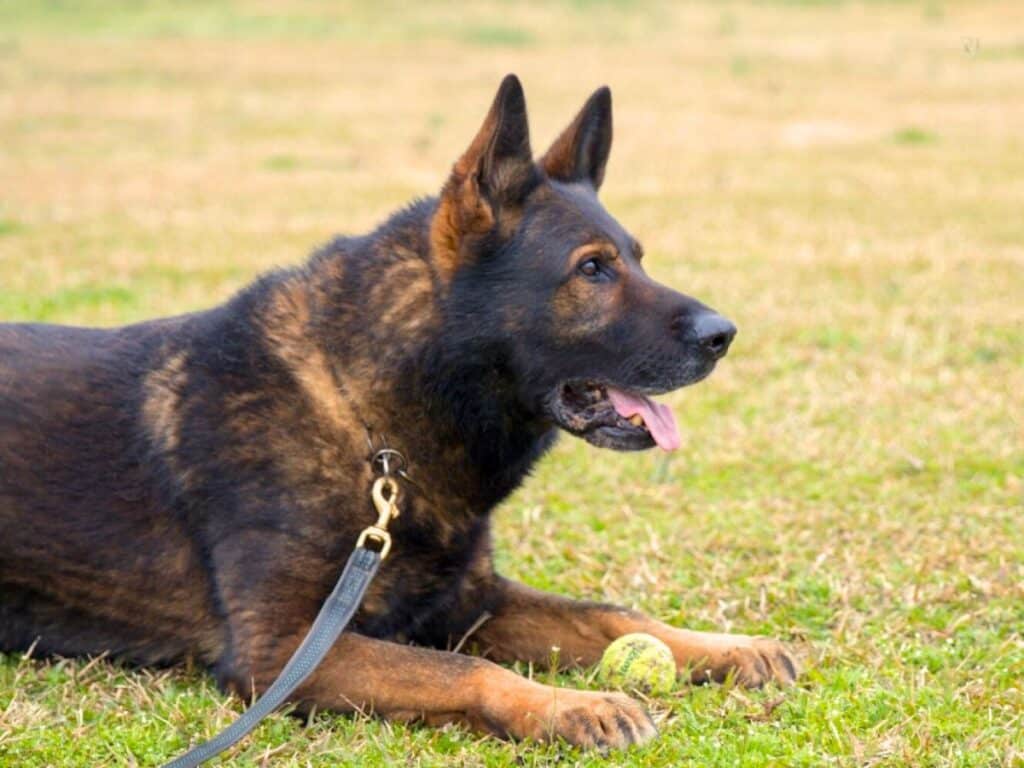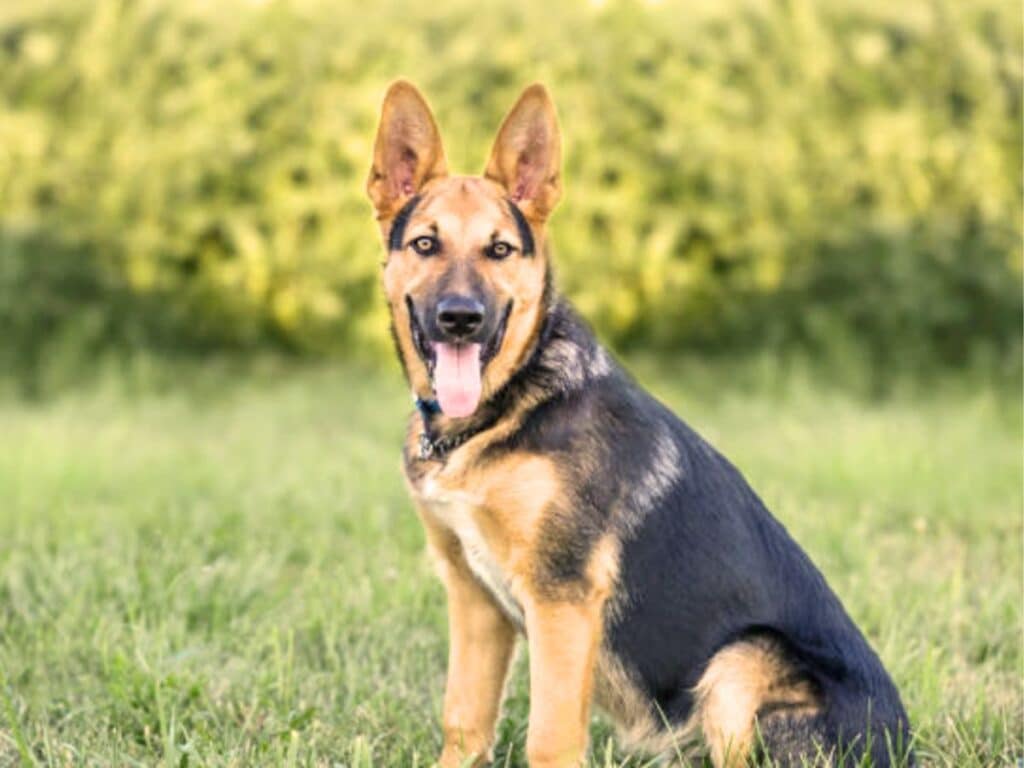So you now have an 11-week-old German Shepherd puppy in your home. At this age, these puppies are lively, curious, and rapidly developing.
But don’t worry, we’re here to help you navigate through this exciting yet sometimes overwhelming journey.
From providing the right care and nutrition to understanding their changing needs as they grow, we’ll guide you every step of the way.
11 Week Old German Shepherd: In a Nutshell
Below is a comprehensive table outlining various aspects of an 11-week-old German Shepherd’s characteristics, care, and behavior.
| Age | 11 weeks |
| Weight | Males: 20-30 pounds Females: 15-26 pounds |
| Height | Males: 8-11 inches Females: 7-10 inches |
| Ears | May still be floppy or starting to stand erect |
| Eyes | Dark and alert, with a keen expression |
| Teething | Baby teeth are still present; teething may occur |
| Diet | High-quality puppy food, 3-4 meals a day |
| Feeding Amount | Follow the recommended portion sizes on the package |
| Training | Basic commands like sit, stay, and come can be introduced; focus on positive reinforcement |
| Socialization | Exposure to various environments, people, and other animals |
| Exercise | Short (15-30 minutes) play sessions and walks; avoid strenuous activities |
| Sleep | About 15-18 hours per day, in short naps and longer periods |
| Healthcare | First vaccinations should have been administered; schedule regular vet check-ups |
| Behavioral Changes | Curious and playful; may start to show signs of independence |
| Challenges | May exhibit chewing behavior due to teething; requires patience and consistent training |
Remember that individual puppies may vary, and these details provide a general overview. Regular veterinary check-ups are essential to monitor the puppy’s health and ensure they are on the right track for growth and development.
You can learn more about the importance & timing of vaccinating your GSD pup by referring to my article: German Shepherd Vaccination Schedule.

Size of a 11-Week-Old German Shepherd
An 11-week-old German Shepherd male typically weighs between 20 to 30 pounds. whereas a female typically weighs between 15-26 pounds.
In terms of height, an average 11-week-old German Shepherd male stands at around 8 to 11 inches tall at the shoulder. Female GSDs, on the other hand, are typically 7-10 inches tall at this age.
However, it’s important to note that individual puppies may vary slightly in weight and height depending on factors such as genetics, diet, and exercise.
It’s also worth mentioning that these measurements are just estimates and should be used as general guidelines. As your German Shepherd puppy grows, they will continue to gain weight and increase in height over time.
You can refer to the following Height and Weight Chart to track the growth of your GSD pup and ensure they are on track for a healthy and happy life.

RELATED: German Shepherd Growth & Weight Chart

Ears of a 11-week old puppy
At 11 weeks old, a German Shepherd puppy’s ears are likely still in the process of developing and may not yet have fully stood up.
Some German Shepherd puppies have ears that stand up early, while others may take several months for their ears to fully stand.
During the teething and growth phases, it’s not uncommon for a puppy’s ears to flop over or go through various positions.
The cartilage in the ears is still firming up, and the muscles are developing, which contributes to the final position of the ears.
This is a normal part of their growth, and as teething concludes, the cartilage strengthens, and the ears often begin to stand upright.
RELATED: When Do German Shepherd Ears Stand Up?
11 Week Old German Shepherd Behavior
At 11 weeks old, a German Shepherd puppy is in the midst of a crucial developmental stage, displaying a range of behaviors that reflect its innate characteristics and early socialization. Here’s an overview of the typical behavior you can expect from an 11-week-old pup:
Curiosity and Playfulness
- At 11 weeks, your puppy will likely explore its environment enthusiastically, investigating new scents, sights, and sounds.
- Playfulness is a dominant trait during this stage. Your puppy will engage in short bursts of energetic play, showing a keen interest in toys and interactive activities.
Bonding and Socialization
- German Shepherds are social animals, and at 11 weeks, your puppy is primed for bonding with its human family. Expect your puppy to seek attention, affection, and comfort from you and other household members.
- Early socialization is crucial during this period. Positive interactions with various people, animals, and environments will help your puppy develop into a well-adjusted adult.

Biting and Nipping
- At this age, a German Shepherd may exhibit biting and nipping behavior. It is important to redirect their attention to appropriate chew toys and discourage biting on hands or clothing.
RELATED: How To Stop German Shepherd Puppy From Biting
Teething and Chewing
- Teething is a common behavior at this age, and your puppy may exhibit a strong urge to chew. Provide appropriate chew toys to soothe teething discomfort and discourage inappropriate chewing on household items.
RELATED: German Shepherd Behavior Stages By Age: Puppy To Senior Years
Sleep Patterns
- An 11-week-old German Shepherd puppy still requires a significant amount of sleep, typically around 15-18 hours per day. This includes both short naps and longer sleep periods.
RELATED: How Much Do German Shepherd Puppies Sleep?
Independence and Exploration
- As your German Shepherd puppy gains confidence, you may notice signs of independence. They might venture out a bit further during walks and explore their surroundings more autonomously.
- Encourage safe exploration while maintaining a watchful eye to ensure your puppy’s safety.
Eager To Learn
- While attention spans may be short, an 11-week-old German Shepherd is capable of learning basic commands. Introduce simple commands like “sit,” “stay,” and “come” using positive reinforcement techniques.
- Keep training sessions short, engaging, and fun to maintain your puppy’s interest and build a foundation for future training.
RELATED:
- What To Expect From a 3 Month Old German Shepherd
- German Shepherd Behavior: Their Strange Quirks Explained
- How To Discipline A German Shepherd Puppy

Establishing a Daily Routine for Your Puppy
Creating a structured routine for your puppy is essential for fostering a sense of security, predictability, and overall well-being.
- Feeding Schedule: Set regular times for feeding to regulate your puppy’s meals.
- Potty Breaks: Take your puppy outside for bathroom breaks at consistent intervals, such as after meals, waking up, and before bedtime.
- Play and Exercise: Incorporate designated play and exercise sessions into your daily routine. Plan interactive playtime and short walks to keep them engaged and burn off excess energy.
- Sleep Schedule: Ensure your puppy gets adequate sleep by establishing a regular sleep schedule.
- Training Sessions: Integrate short, focused training sessions into your routine to reinforce basic commands and encourage mental stimulation.
- Quality Time: Allocate dedicated quality time for bonding and affection.
- Gradual Independence: Encourage gradual independence by incorporating short periods of alone time into the routine.
As your puppy grows, their needs and energy levels will change. Adjust the routine accordingly, ensuring that they receive appropriate amounts of food, exercise, and mental stimulation.

RELATED: 14 Week Old German Shepherd: Size, Nutrition & More
Feeding Guidelines for an 11-Week-Old German Shepherd
Feeding your 11-week-old GSD is an essential aspect of their overall health and development. Providing them with the right nutrition during this stage is crucial to support their growth and ensure they have the energy they need.
Here are some feeding guidelines to help you navigate this important phase:
High-Quality Puppy Food
Choose a high-quality puppy food that is specifically formulated for large-breed puppies. German Shepherds are considered a large breed, and their nutritional needs differ from smaller breeds. (Source)
Feeding Schedule
Establishing a regular feeding schedule is important for your German Shepherd’s digestion and overall routine. Here’s a sample feeding schedule you can follow:
- Divide the daily recommended amount of food into three to four meals throughout the day.
- Feed your puppy at consistent times each day, such as breakfast, lunch, dinner, and a small snack before bedtime.
- Monitor your puppy’s appetite and adjust the portion sizes accordingly. Avoid overfeeding, as it can lead to weight gain and other health issues.
Portion Sizes
Determining the right portion sizes for your German Shepherd can be a bit challenging. Here are some general guidelines to help you:
- Follow the feeding instructions provided by the food manufacturer based on your puppy’s weight and age.
- Monitor your puppy’s body condition and adjust the portion sizes accordingly. You should be able to feel their ribs without seeing them.
Proper hydration is crucial for your German Shepherd’s overall health. Make sure your puppy always has access to fresh, clean water.
RELATED: Do German Shepherds Drink a Lot of Water?
Treats and Supplements
While treats are a useful tool for training, be mindful of the calorie content. Choose healthy, puppy-appropriate treats, and factor them into the overall daily caloric intake.
Always remember that these guidelines are general recommendations, and your puppy’s specific nutritional requirements may vary.
Consulting with a veterinarian ensures that you’re providing the best possible diet for your puppy based on their individual needs and health status.
RELATED: What Do German Shepherds Eat?
How much to feed an 11-week-old German Shepherd?
The amount to feed can vary, but a general guideline is to feed around 1.5 to 2 cups of puppy food per day, divided into three or four meals.
This can be adjusted based on your puppy’s individual needs, weight, and the recommendations on the food packaging.
Make sure you’re feeding high-quality puppy food that is specially formulated to meet the nutritional needs of growing dogs.
Look for a brand that meets the standards set by the Association of American Feed Control Officials (AAFCO).
Always follow the feeding guidelines provided by the dog food manufacturer and make adjustments as needed based on your puppy’s growth and development.

Check out this video of a cute 11-week-old German Shepherd puppy undergoing training…
Exercise and Training Essentials for Your Puppy
When it comes to exercise and training a German Shepherd puppy, there are a few essentials to keep in mind.
These activities not only help them burn off energy but also promote good behavior and mental stimulation. Here are some tips to get you started:
- Basic commands: Start teaching your puppy basic commands like sit, stay, and come. Use positive reinforcement techniques such as treats and praise to reward good behavior.
- Leash training: Get your puppy comfortable with wearing a leash and walking on it. Start with short walks and gradually increase the duration and distance.
- Crate training: Introduce your puppy to a crate as a safe and comfortable space. Use positive reinforcement to encourage them to enter the crate willingly.
- Potty training: Establish a routine for regular bathroom breaks and reward your puppy for going in the designated area. Consistency is key for successful potty training.
- Interactive toys: Provide your puppy with a variety of interactive toys that stimulate their mind and keep them entertained. Puzzle toys and treat-dispensing toys are great options.
- Structured playtime: Engage in structured play sessions with your puppy, incorporating activities like fetch, tug-of-war, and hide-and-seek. This helps build their physical fitness and strengthens the bond between you.
- Exercise outlets: German Shepherds are an active breed that requires plenty of exercise. Take your puppy for daily walks, play fetch in the backyard, or consider enrolling them in puppy agility classes.
- Socializing with people & other dogs: Arrange playdates with other well-behaved dogs and their owners to help your puppy learn appropriate social skills and manners.
- Consistency and patience: Remember that training takes time and consistency. Be patient with your puppy and celebrate their successes along the way.
By following these exercise and training essentials, you’ll be setting your puppy up for a lifetime of good behavior and happiness. Remember to tailor the activities to your puppy’s individual needs and always prioritize their safety and well-being.
RELATED:
- How To Potty Train a German Shepherd Puppy Easily
- How To Stop a German Shepherd From Pulling on The Leash
How much exercise does my 11-week-old German Shepherd need?
While exercise is important for your puppy’s physical and mental well-being, it’s essential not to overdo it at this young age.
Aim for short play sessions multiple times a day instead of prolonged strenuous activities. Around 15-20 minutes of low-impact exercise like gentle walks or indoor games are generally sufficient.
RELATED: How Much Exercise Does a German Shepherd Puppy Need?
Addressing Common Training Challenges
- Patience During Adolescence: Understand that adolescence can bring about testing behavior. Be patient and consistent in your responses to discourage unwanted behaviors.
- Redirecting Undesirable Behavior: Instead of scolding, redirect your puppy’s attention to an appropriate behavior. For example, if they start chewing on furniture, offer a chew toy as an alternative.
- Keep training sessions short and focused. Puppies have shorter attention spans, so aim for sessions that are five to ten minutes long to maximize effectiveness.
- Frequent Repetition: Repeat commands regularly throughout the day in different settings to reinforce learning. Consistent repetition helps solidify obedience.
RELATED:

Importance of Early Socialization
Early socialization involves exposing your German Shepherd puppy to a diverse range of sights, sounds, and situations during their critical developmental period. (Study)
This usually occurs between 7 and 16 weeks of age, making the 11-week mark an opportune time to begin.
- Introduce your puppy to different environments, surfaces, and objects.
- Allow them to explore and interact with a variety of textures, such as grass, pavement, and different indoor surfaces.
- Encourage positive encounters with various people, including children, adults, and individuals wearing hats, sunglasses, or different attire.
- Take your puppy to parks, pet-friendly stores, and other public spaces where they can observe and interact with different people and animals
By prioritizing socialization during these early weeks, you set the stage for a well-rounded adult German Shepherd who is confident, adaptable, and comfortable in various situations.
RELATED: How To Socialize Your German Shepherd: 7 Practical Examples
Vaccinations & Parasite Prevention
Ensuring the health and well-being of your 11-week-old German Shepherd is crucial. One of the first steps in caring for your puppy is to prioritize vaccinations.
Vaccines protect against common diseases and can prevent serious illnesses. Consult with your veterinarian to determine the appropriate vaccination schedule for your German Shepherd.
In addition to vaccinations, parasite prevention is essential. Fleas, ticks, and worms can pose significant health risks to your puppy.
Regularly administer preventive medications recommended by your veterinarian to keep these parasites at bay.
Maintain a consistent schedule for veterinary check-ups and vaccinations. Your veterinarian will guide you on the necessary vaccinations and preventive treatments to keep your pup healthy.
RELATED: German Shepherd Puppy Vaccination Schedule
What vaccinations does my 11-week-old German Shepherd need?
At this stage, your German Shepherd should have received their first set of vaccinations which typically include distemper, parvovirus, adenovirus (hepatitis), parainfluenza, and sometimes leptospirosis. Consult your veterinarian for an accurate vaccination schedule tailored to your pup’s specific needs.

Addressing Common Health Concerns
Hip and Elbow Dysplasia: German Shepherds are predisposed to hip and elbow dysplasia. Regular vet check-ups can help detect and address these conditions early on.
Skin and Coat Health: Monitor your pup’s skin and coat condition. A healthy diet, regular grooming, and attention to any skin issues contribute to a glossy and vibrant coat.
Learn how to identify signs of potential health issues
Keep an eye out for any signs of illness or discomfort in your GSD, such as changes in appetite, lethargy, vomiting, diarrhea, or abnormal behavior.
If you notice any concerning symptoms, it’s best to consult with a veterinarian who can provide appropriate guidance and treatment.
When to seek professional advice from a vet
If your puppy experiences severe symptoms like difficulty breathing, persistent vomiting or diarrhea, uncontrolled bleeding, seizures, or extreme pain, it’s crucial to seek immediate veterinary care.
Routine check-ups and vaccinations are necessary to keep your German Shepherd protected against common diseases.
Grooming Your Pup
Regular brushing is essential to keep your pup’s fur clean and free from mats. This will also help distribute natural oils and promote a healthy coat.
As your German Shepherd begins teething, it’s important to introduce them to teeth cleaning early on. Regular toothbrushing with a dog-specific toothpaste will help prevent dental problems in the future.
Shepherds are prone to ear infections due to their floppy ears and can benefit from weekly ear cleanings using a veterinarian-recommended solution.
Long nails can cause discomfort and affect their mobility. Regularly trimming your German Shepherd’s nails will help prevent any potential injuries or issues.
Preventive healthcare measures such as flea control are also crucial for maintaining your puppy’s health.
Consult with your veterinarian about the best flea control options for your 11-week-old German Shepherd.
Conclusion
May this guide serve you as a valuable resource, offering insights and practical tips to enhance the well-being of your German Shepherd and strengthen the bond between you. Cherish the shared adventures, celebrate the milestones, and revel in the companionship that your 11-week-old German Shepherd brings into your life.




